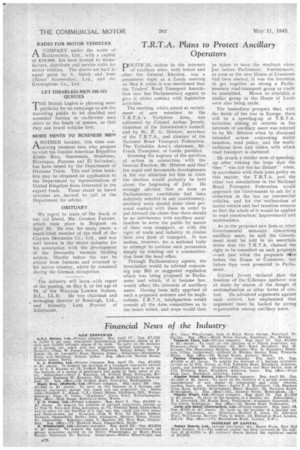T.R.T.A. Plans to Protect Ancillary Operators p OLITICAL action i ii the
Page 26

If you've noticed an error in this article please click here to report it so we can fix it.
interests of ancillary users, both before and • afterthe General Election, was a prominent topic at a Leeds meeting on May 3, when it was mentioned that the Traders' Road Transport Associa'tion now has Parliamentary agents to give it closer contact with legislative activities.
The meeting, which aimed at recruitment ot new members to the ,T.R.T.A.'s Yorkshire Area, was addressed by Colonel Arthur Jerrett, chairman of the Association's council, and by Mr, F..G. Bristow, secretary of the T.R.T.A., and director of the National Road Transport Federation. The Yorkshire Area's chairman, Mr. Frank Thompson, of Leeds, presided.
Stressing the urgency of the question of action in connection with the General Election, Mr. Bristow said that the rapid and favourable developments in the war situation led him to think the election would probably be held about the beginning of July. He strongly advised that so *soon as Parliainentary candidates had been definitely selected in any constituency, ancillary users should make close personal contact with them in order to put.foraard the claim that there should be no interference with ancillary users' freedom to serve the public by means of their own transport, or with the right of trade and industry to choose their own form of transport. It was useless, however, for ,a national body to attempt to exercise such persuasion simply by sending out a communication front the head office.
• Through Parliamentary agents, the Association would be advised concerning any Bill or suggested regulation which was being proposed in Parliament and. which, if it became law, would affect, the interests of ancillary Users: Having been fully apprised of such a proposed measure and its implications, ..F.R.T.A. headquarters would consult all the Area committees as to the issues raised, and steps would then
be taken to have the resultant views Put before Parliament. Furthermore, so soon as the new House of Commons had 'been elected, it was the intention to get together as strong a Parliamentary road-transport group as could be assembled. Moves to establish a similar group in the House of Lords were also being made. •
The immediate prospect that, with the finish of the war in Europe, there will be a speeding-up of T.R.T.A. -activities aiming at reforms in the interests of ancillary users was referred to by _Mr. Bristow when he discussed intended action concerning motor taxation, road policy, and the multitudinous laws and orders with which road transport is cluttered.
He struck a similar note of speedingup after voicing the hope that the time " was not too far distant " when, in accordance with their joint policy on this matter, the T:R.T.A. and the other two associations in the National Road Transport Federation would approach the Government to ask for a 'reduction in the tax on commercial vehicles, and for the reallocation of motor vehicle and fuel taxation revenue so that the whole of it would be applied to road construction; improvement and maintetiance.
As to the proposed new laws or other Governmental measures concerning ancillary users, he said the Government must be told in no uncertain terms that the T.R.T.A. claimed the right to be consulted on such proposals --not just when the proposals viere before the House of Commons, but before they were presented to Parliament.
Colonel Jerrett declared that the freedom of the C-licence operator was at stake by reason of the danger of nationalization or other forms of control. He advanced arguments against such control, but emphasized that argument must be backed by strong organization among ancillary users.




























































